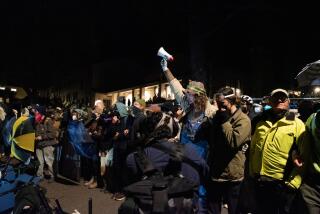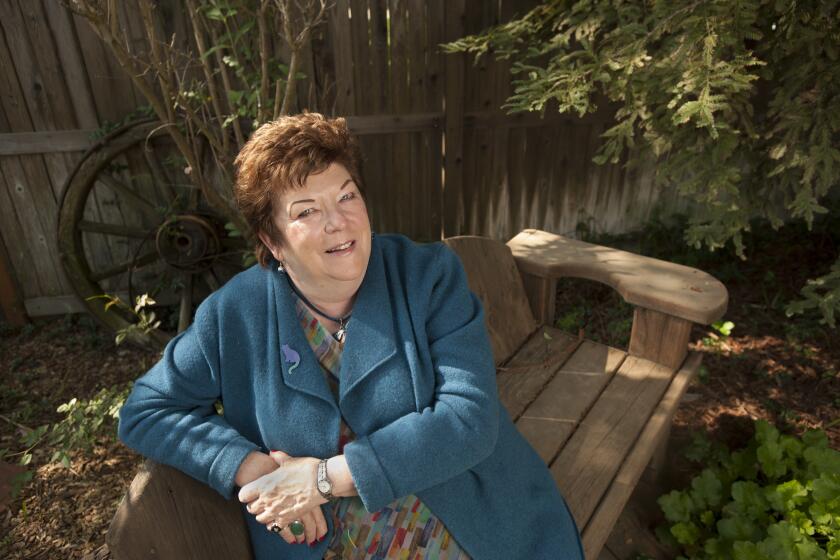HOLLYWOOD: Opposing Visions of the Future : Two civic leaders with strongly held views symbolize the continuing struggle over how a community can best serve its people and business. : DOREET ROTMAN: She says she is standing up for small property owners and the American way.
As Hollywood’s $922-million redevelopment project gets under way, two camps are battling over the historic community. Big-business interests, led by Bill Welsh and the Hollywood Chamber of Commerce, have been pushing for tall new buildings and extensive commercial development. But many merchants and homeowners, represented by cafe owner Doreet Rotman, are fighting for smaller-scale development to preserve more of the community’s small shops, comfortable neighborhoods and historic landmarks.
At 6 o’clock every morning, Doreet Rotman arrives on Hollywood Boulevard to open the Snow White Cafe, her small piece of the American dream.
The Romanian immigrant steers clear of the drug dealers and street thugs who huddle against the morning chill. She steps over littered sidewalks and past homeless men and women--sometimes even children--forced to sleep on the hard, cold pavement of the Walk of Fame.
“I have seen children in the wintertime with no coat or nothing,” Rotman said in halting English. “I have seen too many kids on the boulevard sick, with infections . . . and fathers who would rather spend $1 on cigarettes than spend $2 to take a ride” to a free clinic.
Three years ago, Rotman hoped that redevelopment would help to solve those ills. But now, like many community members, she is bitter and cynical. She charges that the $922-million redevelopment plan, adopted by the Los Angeles City Council last May, was written more to foster new commercial development than to address the real concerns of Hollywood’s residents.
As president of the Hollywood Boulevard Merchants Assn., Rotman has led opposition to the plan. She says the plan contains too few provisions for helping the poor, for controlling growth, for relocating displaced merchants and for guarding against property condemnation.
Collecting Paper Work
Rotman has been gathering documents and minutes of meetings to assist with a lawsuit filed last year challenging the plan. She hopes the suit, brought by members of the community group, Save Hollywood Our Town, will lead to changes in the plan such as revisions that would reduce the land areas subject to condemnation, guarantee that historic landmarks will be preserved and increase the money available to the poor, the homeless and to merchants and residents who may be forced out of Hollywood by redevelopment.
As court dates approach, Rotman has become a lone wolf on the 25-member Project Area Committee, known as the PAC, a citizens group required by state law to help write the redevelopment plan and put it into effect. At monthly PAC meetings, often the scenes of picketing and heated conflict, Rotman wages a dogged, largely uphill battle against members of what she sees as Hollywood’s big-business community.
Her fight focuses on large-scale projects such as the $150-million Melvin Simon complex, which is expected to bring a 400-room hotel, an office tower and a motion-picture museum to a site near Mann’s Chinese Theatre. That project, approved by the City Council in December, is only the first of what redevelopment officials hope will be several large commercial developments on Hollywood Boulevard.
“We have (the) highest infant mortality” rate in Los Angeles, Rotman said, citing the Community Redevelopment Agency’s own study of Hollywood. “Our neighborhood is poor . . . there’s no child care. My common sense tells me, if we have all these problems, that a high-rise building is not going to eliminate them.”
Outspoken and assertive, Rotman has repeatedly criticized the pro-development stance of the Hollywood Chamber of Commerce--in particular, its president, Bill Welsh, and 11 other chamber officers who sit on the 25-member PAC. She says that big-money chamber members have lost sight of their roots in the community.
Lawsuit Threatened
Fearful that her own small coffee shop will give way to redevelopment, Rotman has lashed out against what she calls the “Muppets of Bill Welsh” and “Bill Welsh’s Mickey Mouse Mafia”--attacks that at one point drew a written threat of a lawsuit from Welsh.
As Welsh put it in an interview, “My lawyer suggested if she really thought I was a part of the Mafia, he could arrange for her to explain it to a judge. My tongue might have been in my cheek a little bit . . . but I could certainly take it out of my cheek and get serious.”
Rotman shrugs off the dispute, saying she does what is necessary to protect herself and the community.
“The main goal of the chamber . . . is to run anybody who’s not wealthy and famous out of Hollywood . . . (and) to hell with them,” she said in an interview. “This is something I cannot lie back and take. That’s why the PAC--the majority of the PAC--cannot figure me out. . . .
“I have been alienated from the PAC. . . . Nobody says, ‘Hi, Doreet, how are you?’ They don’t even talk to me. I have been called all kinds of names, and told so many times that in America you have to be more agreeable.”
Defending Property Owners
Rotman said she is standing up for the American way, defending the rights of small property owners to keep their land except in the most extreme cases. “I’m not against eminent domain,” she said. “(But) I still look to the United States as a land of opportunity for anyone.”
Many of the small merchants and apartment tenants who live in the 1,100-acre redevelopment area are ill prepared to stand up for themselves, Rotman said. Many are immigrants who speak little or no English; often, she said, they are so busy working to pay their rents that they cannot become involved in complex, seemingly distant redevelopment issues.
Rotman has taken up the crusade with a style that even her supporters find unusual. Fond of low-cut dresses and quaint expressions--her voice sounds remarkably like Garbo’s--she often comes across as less than serious, according to former PAC member Brian Moore, president of the Federation of Hillside and Canyon Assns.
“She dresses flashily . . . she’s a striking-looking woman,” Moore said. “I think some (people) . . . women in particular, were put off by that in the beginning. . . . By now they realize what a sterling integrity she has.”
Moore, who initially supported the redevelopment effort, later joined Rotman in opposing the plan.
Moore said Rotman has taken the time, despite difficulties with written English, to read each of Los Angeles’ 17 redevelopment plans to give her perspective on Hollywood’s. A single parent, she attends PAC meetings and City Council hearings in between ringing up lunch orders and raising her 6-year-old daughter, Reesa, who sometimes clears tables on weekends.
Focus on Social Services
“Her primary concern from the beginning was for child care centers and social services” as part of the redevelopment effort, Moore said. “And she’s never wavered from that. She’s done it in the face of great criticism . . . from Bill Welsh and his crowd. They’ve always used her as a butt of ridicule.
“But that’s never fazed her.”
One reason many PAC members have never taken Rotman seriously has been her inexperience with the ins and outs of American bureaucracy, said Fran Offenhauser, a former PAC member who joined with Rotman in criticizing the redevelopment plan. Offenhauser recalled “poignant” PAC meetings where Rotman, unable to find a baby sitter, would attend with her young daughter, only to be rudely voted down by the committee majority.
“They stonewalled her. They treated her brutally,” Offenhauser said. “Doreet tried to use the public forum. If you’ve been around for a long time, you realize nothing gets done in a public forum. If you haven’t lined up your troops before a public meeting, you’re not (ever) going to convince them. . . .
“She didn’t know that. She was ostracized. It got to the point where people just lost patience with her totally. People would just shut their ears whenever she spoke.”
But Rotman won at least one important victory in spite of the PAC. She helped push through last-minute revisions to the plan aimed at funneling a share of Hollywood redevelopment tax revenues into social services such as child care, drug counseling and aid to the homeless. She had argued for 1% of the new tax revenues to go into such programs; chamber members fought the provision.
Support From Woo
Shortly before the City Council voted to adopt the plan in May, newly elected Hollywood-area Councilman Michael Woo sided with Rotman, revising the plan to set aside 10% for social programs. Although critics say the wording still isn’t strong enough to guarantee the money, Rotman’s role in the changes was clear.
“The language related to social services . . . would not be there if not for her,” Woo said. “I think she’s made some real contributions to the (redevelopment) process. She gets her point across.”
Rotman’s Snow White Cafe, next door to the Hollywood Wax Museum, is decorated with colorful flower boxes, prints from the Disney film and a life-size mechanical witch that sits atop a rafter, endlessly stirring a black caldron.
These days, it is a frequent gathering place for opponents of the redevelopment plan, including Moore, Scott Halper of the Hollywood Homeowners and Tenants Assn., and Brad Berlin, a member of the Hollywood Homeowners group who has been heavily involved in the lawsuit filed by Save Hollywood Our Town.
Two factions now seem to exist in Hollywood, said restaurant owner Arland (Buzz) Johnson, former president of the Hollywood Coordinating Council. On one side are those, like Welsh and the Chamber of Commerce, who want to build and change the community; and opposite them are people who fear what those changes will mean, and who want to preserve what they see as good parts of the area.
Rotman is one of the strong-willed leaders of that second group, Johnson said.
“She’s very emotional,” Johnson said. “She believes in what she’s doing and she fights for it. Doreet has got more out of that redevelopment agency than anybody on the PAC. . . . You’ve got to give her credit for that.”
‘Destructive Force’
Yet others are not so charitable. PAC member Marshall Caskey, the committee’s former chairman, said her tireless opposition to the plan, even after its adoption by the City Council, has made her a “destructive force” for Hollywood.
“When it came time to join hands, the chamber (members) joined hands and Doreet was still standing out there hollering,” Caskey said.
Caskey said Rotman’s work on behalf of social causes pales next to that of Welsh, who has spent years participating in community benefits, parades and fund-raising efforts to try to beautify and clean up Hollywood. “When Doreet characterizes herself as the only person who cares about the downtrodden and poor,” Caskey said, “she’s got 25 years of catching up to do. It’s baloney.”
Rotman counters by saying that Welsh and other chamber officials have done nothing to provide for the homeless, the mentally ill and other needy individuals, and that attention still must be placed on those social concerns.
“He (Welsh) vocally opposed anything that would benefit the poor or medium-income individuals,” Rotman said. “What should we do with the human blight? We can’t shoot them. We can’t evaporate them. They’re not going to go away.”
Her own background, as a riches-to-rags immigrant from Transylvania, in the mountainous wilds of Romania, has shaped much of her outlook, Rotman said. Her wealthy father owned a vast spread of land and 300 sheep before occupying communists claimed the family fortune in the early 1960s.
Fleeing to Israel in 1969, her family lived in a small, sparsely furnished apartment, which she left four years later to travel to America.
“I got to be 18 and I was not married,” Rotman said. In Israel, she said, that meant social pressure. “I had neighbors on my back, friends on my back . . . (telling me) to get married. I didn’t feel like being anybody’s tragedy.”
Better Times
In Hollywood, two years later, she got married--a union that lasted from 1975 to 1985. In the better years, she and her husband, a diamond merchant, put money aside. They also bought a multilevel, four-bedroom home with a Jacuzzi and a view atop Mt. Olympus, Rotman said.
But she lost it all after the divorce, Rotman said. She is now in a small apartment, which she shares with her daughter and her notes and legal documents.
“I have learned one thing--money comes, money goes,” Rotman said. “I know what it is to be poor. I live right now in a two-bedroom apartment and I’m so much happier than when I lived in a whole house. It makes me happy more to help somebody, to see somebody given a break.”
More to Read
Start your day right
Sign up for Essential California for news, features and recommendations from the L.A. Times and beyond in your inbox six days a week.
You may occasionally receive promotional content from the Los Angeles Times.






